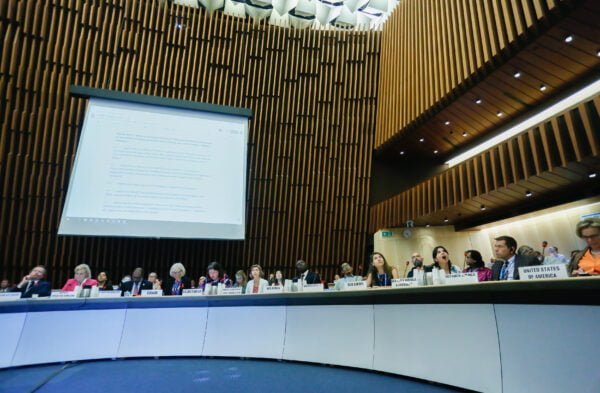Thank you, Madame Chair. Good morning everyone.
Michel, thank you for your report. To our constituencies, it is crucial to see that UNAIDS is taking concrete actions to ensure zero tolerance and zero impunity for harassment and abuse of authority. The #UNAIDSWeNeed must respond to this epidemic also by ensuring it is a place free of any kind of violence, so you can lead by example. Therefore, we welcome the dedicated dialogue this afternoon on sexual harassment because it shows the importance of this issue for this board: an issue that we need to address and solve, while at the same time, we do not undermine the importance of keeping in mind that AIDS is not over yet. In fact, it is not only continuing the work, but to face the fact that the challenges upon us require redoubling efforts to respond to the magnitude of the AIDS epidemic. And the challenges here are not small, nor too little.
Therefore, although we believe that everyone in this room is committed to achieve health for all, to win this epidemic will require more: we need to see your political leadership translated in human and financial resources at all levels, so we can really advance toward a consistent and sustainable HIV response. We are sorry to say, although optimism is important, the reality we face constantly slaps our faces. And, in many places, despite all good words and commitments made here and in New York, we are still leaving too many people behind – including when they need us most: it is time to be more responsive and stop acting as if effective action is impossible in time of crises. It is hard, but impossibility is a myth we feed everyday. We need a focused action through disaster risk reduction in the heart of the HIV response. I am talking about the war in Syria and about the hunger in South Sudan.
I am talking about rising extremisms; attacks on multilateralism and democracy; and shrinking space for civil society to advance the policy agenda. I am talking about Police confiscation of condoms and the rising LGBTI intolerance in many countries; the bill proposing over-criminalisation of key population including towards PWID, extramarital and same-sex sexual activities in Indonesia; the imprisonment of MSM in Nigeria; ARV stock-outs in Papua New Guinea; and the continuous repression and killing of PWUD in the Philippines and Bangladesh. About the killing of transgender women in Brazil, punitive laws in Guyana; the law suits against sex workers in some rich, but unfair countries; and I am talking about the 70,000 people living with HIV in Venezuela that will need to change their therapeutic schemes because Nicolas Maduro’s dictatorship has killed its own health system.
So, the question, I guess, is that we have urgency and we can wait no longer. UNAIDS must do better to protect the rights of people – including the sexual and reproductive rights of women; by adequately funding the progressive civil society and community-led initiatives; and, finally, by reducing inequality within and among countries which is one of the most transformative SDGs, because it addresses both economic inequalities and discrimination that affect poor and marginalized populations.
We need true leadership to achieve that. Leaders that inspire by example. Leaders that can take care of and empower their people, constituencies and employees. And here, in this room, I see many leaders that can push and truly “leave no one behind” by enforcing laws and policies to protect all people without distinction of any kind such as race, class, gender, disability, age, migration status, HIV status, sexual orientation, gender identity or any other status. We know that already, or at least we should have learned it by now.
We have urgency. Failing to overcome AIDS, when we know what to do and how to do it, will be a major setback in the history of civilization. We can do better, much better. But we need to do it together – Member-States, communities and , UN Agencies. We are not there yet, but if we are united we may be able to overcome AIDS. Thanks.

